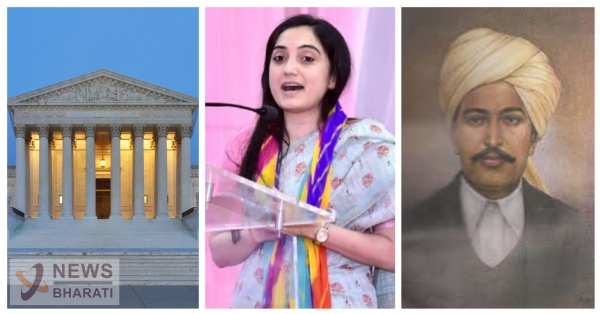Nupur Sharma, Brandenburg test, and 295A
There has been outrage against what the judges have said from many prominent members of the society as well as the common man on the road. But what are the standards because of which morally, legally, and on principle, we object to these remarks?
Total Views |
The ‘Nupur Sharma controversy’ seems to be getting bigger every day. There are at least two known cases of gruesome murders by Islamists of Hindus for supporting Nupur Sharma. We all know that Justice Kant and Justice Pardiwala blamed Nupur Sharma for these killings by saying, “she is single-handedly responsible” for what is happening in the country today.

There has been outrage against what the judges have said from many prominent members of the society as well as the common man on the road. But what are the standards because of which morally, legally, and on principle, we object to these remarks? The moral and principle objection to these remarks is fundamentally based on the freedom of speech. If we agree to the freedom of speech argument, then the legal objection inevitably has to go through the ‘Brandenburg test’. Now, What is the Brandenburg test? To understand that, we have to understand the Brandenburg Vs Ohio case in the United States Supreme Court.
In the famous Brandenburg Vs the state of Ohio case of 1969, the USSC upheld the right of Clarence Brandenburg to exercise his freedom of speech. Clarence Brandenburg, a Ku Klux Klan (KKK) leader in rural Ohio, contacted a reporter at a Cincinnati television station and invited him to cover a KKK rally that would take place in Hamilton County in the summer of 1964. Portions of the rally were filmed, showing several men in robes and hoods, some carrying firearms, first burning a cross and then making speeches. One of the speeches made reference to the possibility of "revengeance" against "Niggers", "Jews", and those who supported them and also claimed that "our President, our Congress, our Supreme Court, continues to suppress the white, Caucasian race", and announced plans for a march on Congress to take place on the Fourth of July. Another speech advocated for the forced expulsion of African Americans to Africa and Jewish Americans to Israel. Brandenburg was charged with advocating violence under Ohio's criminal syndicalism statute for his participation in the rally and for the speech he made. In the relevant part, the statute – enacted in 1919 during the First Red Scare – proscribed "advocating the duty, necessity, or propriety of crime, sabotage, violence, or unlawful methods of terrorism as a means of accomplishing industrial or political reform" and "voluntarily assembling with any society, group or assemblage of persons formed to teach or advocate the doctrines of criminal syndicalism". The U.S. Supreme Court reversed Brandenburg's conviction, holding that government cannot constitutionally punish abstract advocacy of force or law violation. The majority opinion was per curiam, issued from the Court as an institution, rather than as authored and signed by an individual justice.
Also Read: Agnipath: The BJP is reaping what they sowed
The three distinct elements of this (Brandenburg) test (intent to speak, imminence of lawlessness, and likelihood of lawlessness) have distinct precedential lineages. Judge Learned Hand was possibly the first judge to advocate the intent standard, in Masses Publishing Co. v. Patten (1917), reasoning that "[i]f one stops short of urging upon others that it is their duty or their interest to resist the law, it seems to me one should not be held to have attempted to cause its violation". However, the Brandenburg intent standard is more speech-protective than Hand's formulation, which contained no temporal element of imminence. The imminence element was a departure from earlier rulings. Brandenburg did not explicitly overrule the bad tendency test, but it appears that after Brandenburg, the test is de facto overruled. The Brandenburg test effectively made the time element of the clear and present danger test more defined and more rigorous. Applying the Brandenburg test in Hess v. Indiana (1973) the Supreme Court held that the prerequisite for speech which is not protected by the First Amendment is that the speech in question must lead to “imminent disorder”.
Also Read: Why attacking Ira Khan is utterly idiotic?
Now, let's come back to India and talk about Section 295A of the constitution. This IPC section consists of Deliberate and malicious acts, intended to outrage religious feelings of any class by insulting its religion or religious beliefs. The act was passed by the colonial masters after the outrage by the Islamists in Lahore, when ‘Mahashay Rajpal’ published a book called Rangila Rasul (which is banned in India to this day) which itself was a response to a pamphlet called ‘Sitaka Chinala’ published by an Islamist which depicted Sita as a prostitute. When Mahashay Rajpal was released from jail (in the pre 295A era) he was subsequently murdered by an Islamist named Ilm-ud-din or Alimuddin. Interestingly enough the similarities between that case and the Nupur Sharma case are startling. In one part, the author cites characteristics of the prophet, highlighting his ability to marry, which included "a widow, a virgin, an old woman, a young woman... even a budding girl", and insists on how the active sexuality of marriage is more compatible with the common man in contrast with lifelong celibacy of Hindu saints or the asceticism of other prophets. The Bengali newspaper Amrita Bazar Patrika wrote about Rangila Rasool after its publication, it said, "The book 'R. Rasul' which is the subject of the case is a small brochure written by some anonymous but well-informed author who has tried to draw instances from the life of the Prophet. Those who have read the book know that there is no attempt at ridiculing and the facts put forward in simple and innocent language are entirely based on the writings of standard authors on Islam - both European and Muhammedan."
Also Read: The Muslim area trap
Later, In June 1924, Mahatma Gandhi referred to Rangila Rasul in his weekly Young India. "A friend has sent me a pamphlet called R. Rasul written in Urdu, The author's name is not given. The very title is highly offensive. The contents [are] in keeping with the title. I cannot without giving offense to the reader's sense of fine give the translation of some of the extracts. I have asked myself what the motive possible could be in writing or printing such a book except to inflame passion. Abuse and caricature of the Prophet cannot wean a Musalman from his faith and it can do no good to a Hindu who may have doubts about his own belief. As a contribution, therefore, to the religious propaganda work, it has no value whatsoever." This criticism came a month after the publication, after which there were massive protests against the book as well as the publisher, Mahashay Rajpal. Mahashay Rajpal laid down his life for the Freedom of speech on the 6th of April 1929 (the day he was assassinated), but he never gave up the name of the writer (it was revealed many years later) and saved his life.
Also Read: Why Urbanization is a necessity in India
Brandenburg test came into existence 45 years after the 295A. In 2022, if we are not following the Brandenburg test and simply labelling everything outrageous, hateful, and blasphemous as illegal, then we start restricting the rights and freedoms of an individual. If 295A remains, we risk losing our right to free speech, which includes the right to offend one’s feelings, beliefs, and in some cases even faiths. Hinduism inherently doesn't even have a term called blasphemy like Abrahamic religions. In a largely Hindu country, today we have Sec, 295A, which acts as blasphemy law. A section that strikes against the very core of freedom of speech.
Also Read: How did 'Prosperous' Sri Lanka fail?
Today, we are in a situation where British India was 100 years later. If we cave in to the power of the mob and let the street power rule over us, we face nothing but what Lahore, Amritsar, and entire British India faced in 1947. But, if we decide to uphold the principles and uphold our rights, if we show the willingness to die on this hill named Freedom of Speech, then we decisively and collectively say no to the Mob rule. Only then, we may just avoid the catastrophe of 1947. Only if we stand for our principles and freedoms.


